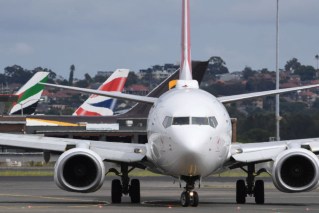Should you book your post-pandemic trip now?


To travel or not to travel ... that is just one question. Photo: Getty
Are you ready to travel again?
Lock down rules are easing, but is it too soon to start planning and booking?
In the short-term, the smart money is on holidaying close to home, taking road trips and self-catering, whether in bush campsites or high-end luxury stays.
“People are meticulously planning their post-isolation escapes,” according to Alexandra Ormerod, chief executive of Luxico, which specialises in luxury home rentals. The company has noticed an almost 140 per cent increase in inquiries from the same time in 2019.
Similarly, research at Booking.com shows the number of Australian properties in its travel ‘wish lists’ has increased from 28 per cent last year to 51 per cent.
Tourism Research Australia revealed that more than 500,000 travellers indicated they would go camping within the next two months.
Nick Baker, chief executive of CamperMate, a caravan and camping app used by almost two million Australian and New Zealand travellers, says “there has been a surge in users over May, with the app downloaded by 5000 users in one week alone”.
But how to travel wisely in this new age?

Post-pandemic, planning is most important – as is reading the fine print. Photo: Getty
Read the fine print
If there’s one thing travellers have learnt from the coronavirus – or should have – it’s that you need to have flexibility and you need to read the fine print. If something changes, can you get your money back, will you be offered a refund or credit, or will you be simply out of pocket?
Are you even allowed travel?
Interstate and even some intrastate travel is still restricted, though that’s set to change probably by July, but as late as September.
The government’s ban (see Smartraveller) on all overseas travel will likely be in place until late in 2020, with the possible exception of New Zealand – part of what’s being labelled a potential trans-Tasman “travel bubble”.
In April, just over 90 per cent of the world’s countries had COVID-related travel restrictions, so when booking for the south of France or Greek Islands or your next cruise, you need to build in flexibility. A second wave or sudden spike in cases could reverse openings and regulations, both here and overseas.
Flexi-Tourism
The South Australian Tourism Commission’s Flexi-Tourism, a partnership with TripAdvisor, caters for uncertain times with its flexible “book now, pay on arrival” options. Travellers can change dates without penalties and cancellation fees.
Surprisingly, elsewhere, there is not much more flexibility in booking arrangements than before the pandemic. It might be that travel companies have had to refund so much that they are worried about surviving.

It’s crucial to check where you can go – and what measures you will face. Photo: Getty
Buyer beware
While some airlines, hotels, cruise lines and others introduced cancellation waivers and refunds during the initial phases of the coronavirus, once it officially became a pandemic, the onus went back on travellers to make sure they are covered.
For flights and hotel bookings, that will usually mean paying for more expensive flexible options, offering free cancellation or credit.
With cruise bookings and package tours, it might mean waiting until the deadline to make the final payment. If there is only a credit and no refund offered for cancellations, at least the company will only be holding your deposit.
Travel insurance is essential as always, but you can’t insure against a known pandemic, so you won’t be covered for that. You can add “change of mind” insurance to some policies, which usually costs more, but many insurers have ceased offering these policies.
Some policies cover a claim only if you cancel before you travel (not if you change your mind during the trip). In fact, many companies have ceased selling travel insurance altogether indefinitely. You need to do your research.
Fly well, fly a (little bit) flexible
While many of us aren’t ready to fly yet (and flights are limited) Qantas is pushing its “fly well, fly flexible” policy.
The flexible aspect means customers can book any Qantas or Jetstar Australian domestic flight between May 21 and June 30, 2020, for travel from June 12 to October 31, 2020, and the airline will waive the change fee for one time, if you decide to change the travel date.
For international flights (except trans-Tasman), customers with existing Qantas or Jetstar bookings for travel between August 1 and October 31, 2020, can cancel their booking and retain the full value as a Qantas flight credit or Jetstar credit voucher.
Note – that’s a credit, not a refund. Flight credits must be requested by June 30, 2020, and are valid for booking and travel by December 31 2021. Jetstar credit vouchers allow up to two years to travel from issue date.
The pathway to travel post-coronavirus looks like being less smooth flying and more bumpy goat track – but, as always with travel, should be worth it.








